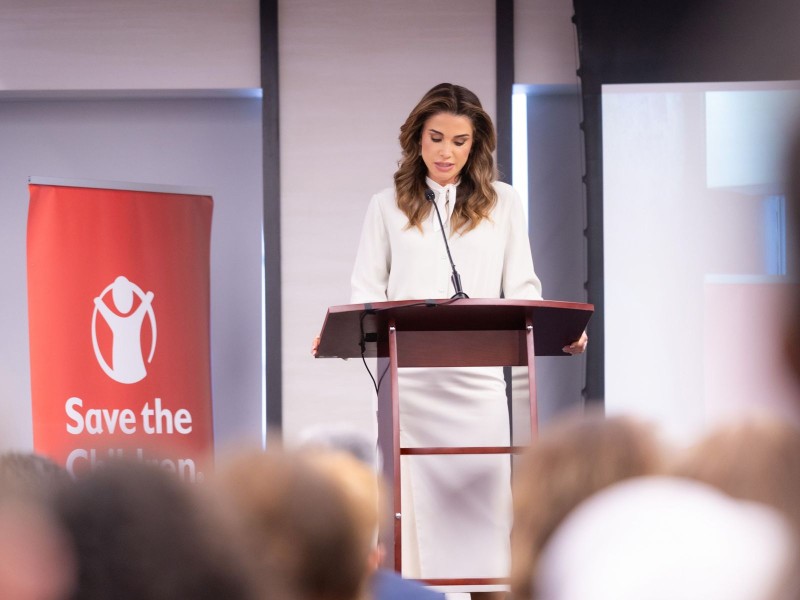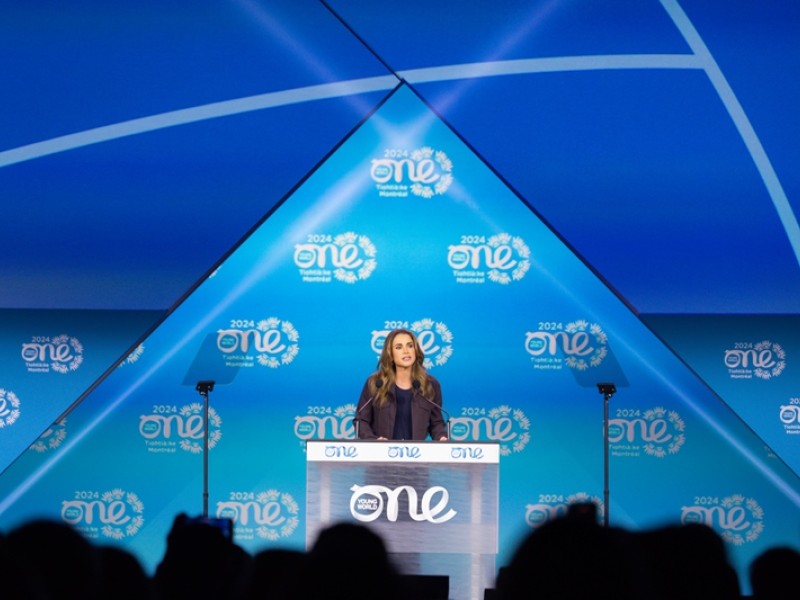Queen Rania's Acceptance Speech at the Foreign Press Association 17th Media Awards Gala - London, UK
I must confess, it’s a bit intimidating to give a speech before a room full of journalists.
But sources close to Queen Rania can confirm that she is humbled and delighted to be here.
I’m also thrilled to be sharing a stage with Hugh Dennis. My husband and I actually have four kids, so we’re part of the Outnumbered Club. There’s no special handshake or membership card. You just have to be tired all day!
But I’m not tired now. I’m energized and inspired.
Thank you, Deborah, for your kind remarks, and for making me feel so welcome.
Henry Luce, the co-founder of TIME magazine, once said, “I became a journalist to come as close as possible to the heart of the world.”
Well, tonight I think I’ve come as close as possible to the heart of journalism.
The FPA’s decision to create this award says a lot about you and your values. Thank you all for shining your collective spotlight on human welfare.
Because, now more than ever, I think we need to focus on our humanity—especially at a time of such profound change and innovation.
You have all witnessed, firsthand, the transformative impact of technology on media.
Now, we are on the cusp of a fourth industrial revolution, and our lives are never going to be the same.
Every day brings another breakthrough in the relationship between man and machine… Driverless cars may soon become the norm on our roads and highways. Smart factories are revolutionizing the way we build and create. Artificial intelligence is helping doctors treat cancer… helping aid workers target relief… and making it easier for children to learn.
So, the distant future is no longer distant. In many ways, the future is here. And I think that’s incredibly exciting. I think it holds great promise for humanity.
And yet, where I find myself stopping short is at the promise of humanity itself. Because I am not quite certain that humanity’s advancement is keeping pace with technology.
The past few decades have seen our world driven by the forces of globalization, and the freer flow of ideas, people, capital, and jobs. In aggregate terms, these changes have been positive in meaningful ways. Global wealth has grown. Global poverty has shrunk. Information is more accessible than ever.
And yet, these numbers mask the realities of individual lives, where the benefits have not been equally shared, and the burdens not equally borne.
The upshot of that disconnect is now becoming clear.
Too many people feel threatened by the pace and scope of change. To them, a world that is moving faster feels like a world spun out of control. They look around, and feel they no longer relate to what they see… no longer know what their future holds… no longer feel like they have a voice.
They feel like their place in the world has been challenged, their identity put at risk. And they are afraid. Instead of hope in the future, or solidarity with those less fortunate, they feel fear.
But when fear overwhelms our thinking, we compromise our logic and compassion.
Because, fear is not a cognitive response. Fear is about reaction, not reflection. Fear tells us to resist and reject the unfamiliar… and to compromise the values we hold dear.
And in many places around the world today, we’re seeing the result. Impulse is crowding out contemplation, and upending the rules of the game.
Even our vaunted modern scientific polling failed to capture the power of human emotions. We knew that globalization was helping shape the future but we failed to see how human fears could undermine it.
That’s the backdrop against which I find myself thinking about this humanitarian award.
We say that our world is more connected than ever—yet, we’re pushing one another away. Our politics are migrating to the extremes and we’re losing the middle ground: closing off instead of opening up; talking of isolationism instead of cooperation… of borders instead of bridges. Permitting labels and stereotypes of others to substitute for personal knowledge and understanding.
That’s why, at a time when technologists are trying to figure out how to code empathy into computers, I believe it’s actually human empathy that needs an urgent upgrade. I think we need to find our way back to the basics of simply listening to each other… of trying to see through each other’s eyes, and to walk in each other’s shoes.
This really hit home when I read an article about the rise of artificial intelligence. The author wrote, “As a species, we are on the verge of birthing the most prodigiously advanced and intelligent child within our known universe.” That is, a super intelligent machine that can reason like a human being, but with a computer’s speed, power, and memory.
I found myself wondering: What would this advanced child think of its parents?
What would it learn from the way politicians are responding to the savagery in Syria—seemingly preoccupied with outmaneuvering one another while civilians are maimed and brutalized and killed?
What would it learn from our apparent numbness to vulnerable, traumatized children? What kind of conditional program would it derive from our responses? IF children are suffering… THEN look away? IF innocents are dying… THEN do nothing?
What would it think of the way we’re handling the global refugee crisis? How would it process the rise of xenophobia and intolerance around the world?
We’ll never be able to teach humanity’s values to machines if we don’t reboot those basic values ourselves. And we’ll never be able to navigate the upheavals of tomorrow, if we cannot tolerate the changes of today.
There’s no simple way forward.
But I think it begins with a new dynamic for leadership. Allaying fear and restoring trust must be a top priority. Part of that is acknowledging where our old insitutions and thinking are falling short. And part of it is genuinely working together to find solutions.
We need to help people prepare for change, to be resilient instead of resistant. We need to equip them with the tools to adapt—to be a part of global progress, not apart from it. We need to find ways to close the gaps of inequality… to alleviate economic anxiety. And we need to make sure that everyone feels they are seen and they are heard.
Because, what we’ve seen in these turbulent times is the vulnerability, or “bug” in our humanity: that when we fail to account for emotions like fear, anxiety, uncertainty, and insecurity, we make it harder to unleash the positive emotions of compassion, kindness, and empathy.
But facing our challenges will take real dialogue, not simply tweeting past one another. This is not about elites talking to elites; or leaders hidden away behind closed doors.
And neither can we permit scapegoating, or divisive messages of anger and blame. We need to recommit to our common values, within our societies and among them.
Put simply, we must be as excited about the advancement of our humanity as we are about the advancement of our technology.
Because at the end of the day, regardless of changes and advances, true progress is all about people.
And that is why I believe your work as journalists is more important than ever. You are as close as possible to the heart of the world… which means you can touch the world’s heart.
Your reporting casts a light into the shadows. Your words convey the voices of the voiceless. Your images bring complex issues into focus. Your analysis educates and inspires.
And, at the same time, you can help us keep our finger on the world’s emotional pulse, to make sure leaders stay better connected to the feelings of the people they serve.
As we reinvent the world around us, you can help us reinvest in one another.
You can help ensure that in an age of technology, we still look out for one another as a human family.
And it’s in that spirit that I’d like to close by dedicating this award to the greatest humanitarians I know: the men and women of Jordan.
Our country is small, with few natural resources… We live in a dangerous neighborhood. And we have been tested by shock after shock… crisis after crisis.
Yet, in the face of Syria’s suffering, we’ve opened our homes and our hearts. Today, roughly one in seven people in my country is a Syrian refugee.
Jordanians have little, yet we are giving our all—because we see our common humanity in our neighbors. I’m not sure a computer program would tell us we’ve been smart—but we are certain that our actions are right, because they represent the most noble of human values.
Whatever the future of artificial intelligence, there is no such thing as artificial compassion.
The children who need us are already here. In Jordan, we’re doing our best to be there for them.
And as we all prepare to face the disruptive changes ahead—let us strive to be better role models… better parents… not only for the children we give birth to, but also for the coming generation of super-intelligent machines we will conceive.
Thank you very much.
Featured
Queen Rania's official website
This website does not support old browsers. To view this website, Please upgrade your browser to IE 9 or greater
Your browser is out of date. It has known security flaws and may not display all features of this and other websites. Learn how to update your browser



